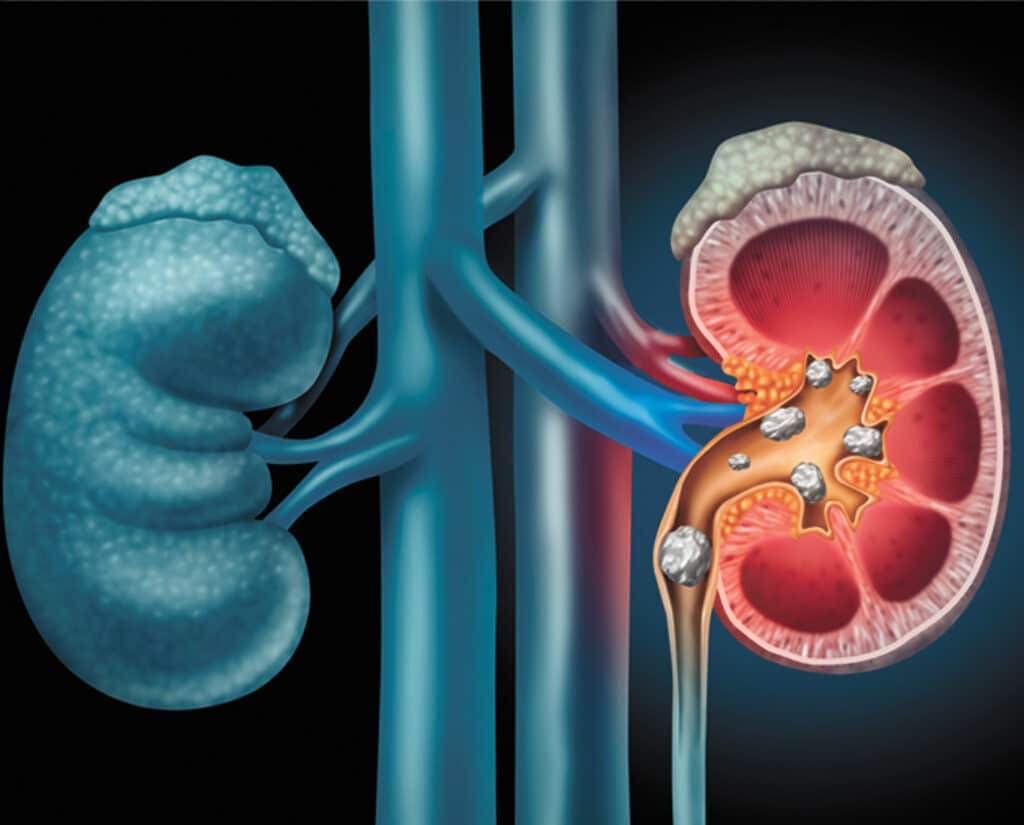By Alejandro Miranda-Sousa, M.D. and Darian Yera, APRN


Calcium stones are the most prevalent among the different types of kidney stones. They are mostly made of calcium oxalate or can be combined with calcium phosphate. Calcium oxalate’s formation can be caused by hyperoxaluria, which leads to the formation of oxalate crystals in urine. Calcium phosphate formation is linked to factors such as renal tubular acidosis and hyperparathyroidism. Calcium oxalate has mainly been found in patients who consume a lot of oxalates (mainly found in nuts and fruits) or patients who have had gastrointestinal disorders. In urine, calcium oxalate appears as envelopes or dumbbells when observed under a microscope. Uric acid stones form about 10% of kidney stones. They are mostly found in people with obesity, hyperuricemia which is the increased amounts of uric acid in serum, and hyperuricosuria which is the increased amounts of uric acid in urine. When observed under a microscope, uric acid stones appear as diamond-like crystals or polarizable rods.
There are several ways to prevent kidney stone disease. Dietary measures are essential in preventing the disease. Reduced intake of foods rich in oxalates such as soy products, leafy vegetables, and chocolate can help prevent kidney stones. Large vitamin C supplements, sugary foods, soft drinks, high salt intake, and high intakes of animal proteins should also be avoided. Animal protein intake should be limited to two meals per day. Increased calcium intake in the diet is advisable as calcium binds with oxalates in the digestive system. High water intake is another measure to prevent kidney stones. It is recommended to drink around eight to twelve glasses of water in a day. Also, the urine output per day should be around two liters. The use of lemonade, ginger ale, and fruit juice can decrease the risk of stone formation. The alkalinization of the urine is also a medical method to prevent kidney stones. This can be done using acetazolamide, which increases the pH in urine. Other pharmaceutical products, such as magnesium citrate, potassium citrate, and sodium bicarbonate, can also increase urine pH. Alkalinizing urine to about 6.5 creates a good environment for dissolving uric acid stones. Diuretics, such as thiazide, are also used to prevent kidney stones. The use of this therapy prevents the formation of calcium oxalate stones by reducing the amount of calcium excreted in the urine.
Alejandro Miranda-Sousa, MD
Dr. Miranda-Sousa is a board certified urologist. He is an author and co-author of multiple research and clinical peer-
reviewed medical articles. He received Best Abstract from the American Urological Association in 2007 and is Fellowship Trained in Urodynamics and Neurourology.
Our providers are highly-qualified, skilled experts in the area of urinary and bladder disorders, pelvic floor prolapse, prostate cancer, along with many other related disorders Dr. Miranda-Sousa and his staff are ready to answer any of your urological questions and concerns, as they treat all of their patients with the utmost of care.
To make an appointment, please call 239-226-2727, or visit their website at urologyexperts.com.
Urology Experts
239.226.ASAP (2727)
www.UrologyExperts.com
Fort Myers
4571 Colonial Blvd
Suite 110
Fort Myers, FL 33996
Bonita Springs/Estero
3501 Health Center Blvd.
Suite 2420
Bonita Springs, FL 34135
Cape Coral
1206 Country Club Blvd.
Cape Coral, FL 33990
 Southwest Florida's Health and Wellness Magazine Health and Wellness Articles
Southwest Florida's Health and Wellness Magazine Health and Wellness Articles

